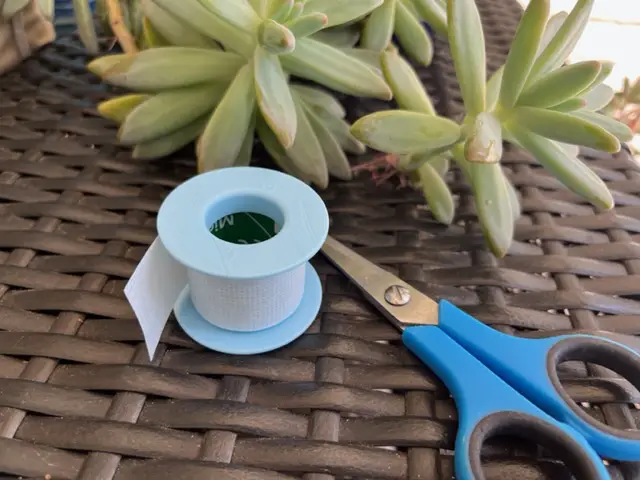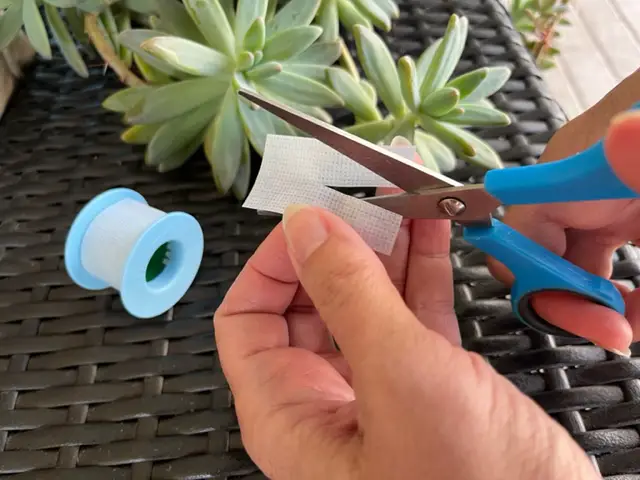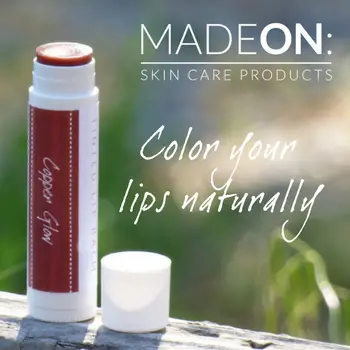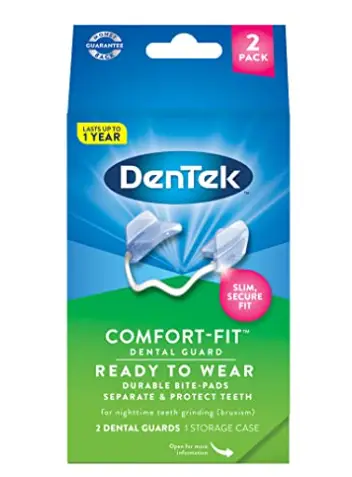Do you find yourself waking up with a sore jaw and a pounding headache, only to realize that you've been grinding your teeth all night?
This was totally me for years, even with expensive night guards. I wore down my teeth and even cracked one that had to be removed. Yikes!
If this is you as well, know that we not alone. Millions of people suffer from this painful problem, which can also lead to sleep disorders and other health issues.
But what if I told you that there's a simple, non-invasive solution that could alleviate your symptoms and improve your overall sleep quality? A simple trick that has helped me immensely!
It's called mouth taping, and it's not as strange as it sounds.
In this article, I'll explain how it works, why it's effective, and how you can do it properly to reap the benefits.
So, grab a roll of tape and read on to discover how you can get a better night's sleep and wake up pain-free.
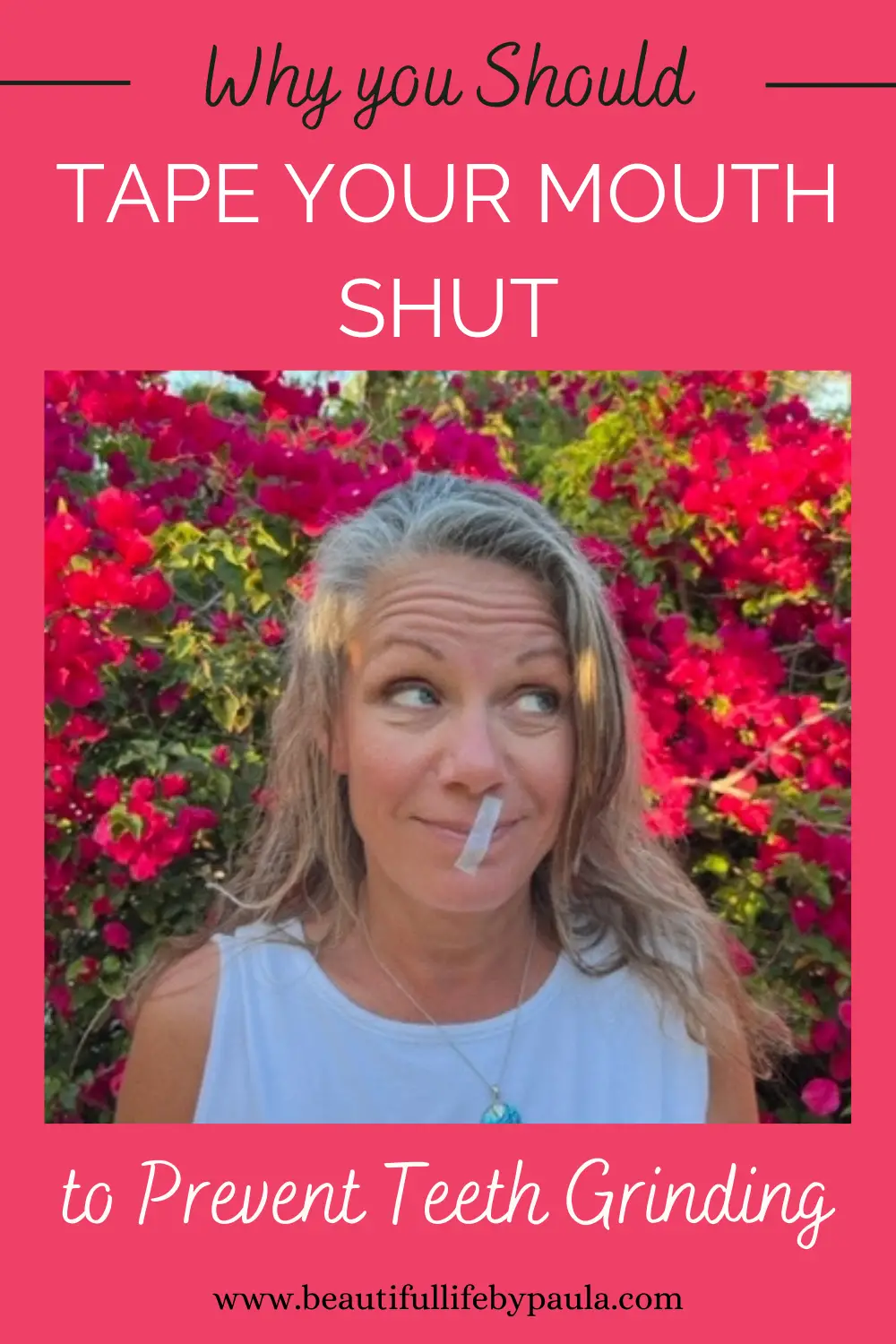
Mouth-Taping Myths
First of all, I need to dispel a big mouth-taping myth.
When people first hear about mouth taping, they think of your whole mouth being taped shut with a big 'ol piece of duct tape.
Something like what my big sister did to my little brother when she got fed up with all of his talking and completely taped his mouth closed with what seemed like a whole roll of masking tape.
No wonder people run the other way when they hear "tape your mouth shut!" That would be totally unsafe and claustrophobic.
(*Note: I do not condone what my sister did back in the '70's. Please do not do that with children or anyone, for that matter! For the record, he only was taped for a few minutes to get the photo, and thought it was pretty funny himself.)
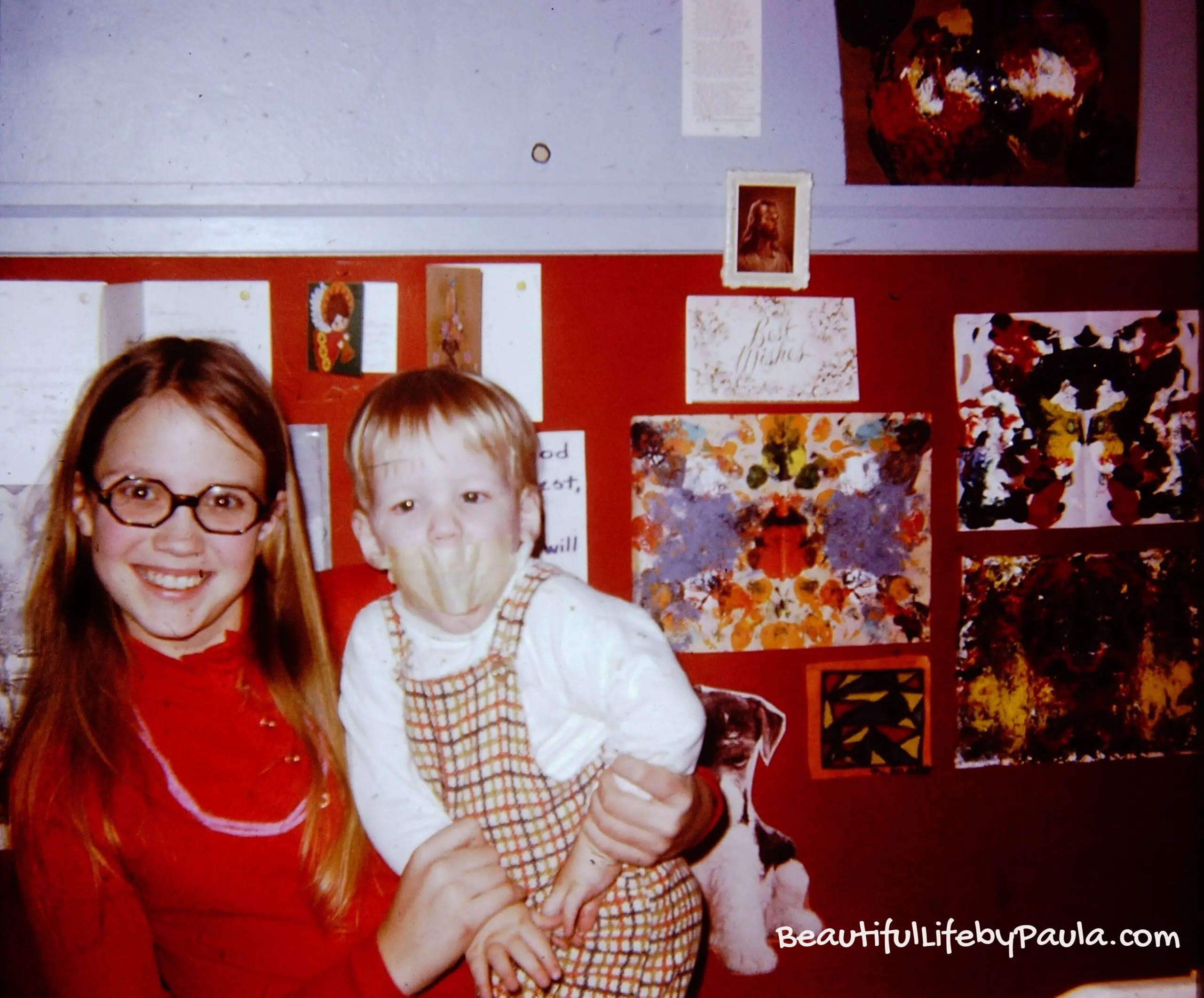
Okay, so now that that has been cleared up (we all know how unsafe that whole decade was, right?) let's get to the good stuff!
Teeth Grinding: A Painful Problem
The continuous grinding of teeth, or bruxism, can cause a host of problems that go beyond dental issues.
In my case, my teeth grinding and clenching caused severe gum recession that led to periodontal surgery, and a cracked molar that had to get a root canal and eventually be pulled.
This was even with wearing custom dental night guards. After many years of grinding though multiple expensive night guards, I wondered if perhaps they were making matters worse. My subconscious mind balked against having that big foreign piece of plastic in my mouth. After going through years of bite guards, the ongoing cost was unsustainable as well.
Bruxism can also lead to long-term headaches, jaw pain, and even earaches. I always knew when I had a particularly rough night of grinding when awakening with a very sore jaw!
If left untreated, bruxism can also cause temporomandibular joint disorder (TMJ), which is a painful condition affecting the jaw joint and muscles that control jaw movement.
Not only does bruxism affect your cranial health, but it can also have an impact on your quality of life.
Teeth grinding can be disruptive to your sleep, leading to daytime drowsiness, irritability, and fatigue.
This can obviously have an effect on your work performance and relationships with others (which no one wants, believe me!)
Mouth taping can provide a practical and affordable solution to this annoying and painful problem.
The process of mouth taping involves placing a small piece of tape over your lips before going to bed. This simple technique helps prevent teeth grinding by keeping your mouth shut while you sleep.
It also helps keep your tongue in the correct position, which can reduce your chances of grinding your teeth and alleviate the accompanying pain. (I'll talk more about proper tongue positioning later in this post, which is super-important, so definitely keep reading!)
In the next section, we'll dive into the mechanics of why mouth taping works and how it can help you get a better night's sleep.
Why Mouth Taping Works
Mouth taping isn't just some improvised idea or an oddball fad. It is a Buteyko breathing technique introduced by the Russian doctor, Konstantin Pavlovich Buteyko.
It's a simple yet effective solution that makes a difference in alleviating the discomforts of teeth grinding.
The notion behind mouth taping draws upon the principles of proper breathing and the correct tongue position.
Breathing through the nose is the optimal way to breathe during sleep and keeping the mouth closed encourages this.
Normally, when you breathe through your mouth, your tongue tends to fall back, which can block the airway and cause snoring or other breathing problems.
I had frequently awakened at night with the feeling like my throat was blocked and I couldn't breathe. This was NOT a good feeling!
However, by taping your mouth closed, you are retraining your brain and tongue to breathe through the nose and stay in the correct position.
This eliminates the possibility of teeth grinding, the involuntary action that often occurs when the tongue falls back to your throat.
By taping your mouth shut, you are creating an environment that helps promote better breathing and prevents the disruption caused by teeth grinding.
This simple yet effective technique, combined with other tips and tricks we'll discuss in the following sections, can mitigate the negative effects of teeth grinding and improve your overall sleep quality.
Health Benefits to Mouth Taping
There are many other benefits to mouth taping besides helping to prevent teeth grinding, because mouth taping promotes nasal breathing rather than mouth breathing. And nasal breathing has all of these health benefits and more:
- Reduces Hypertension
- Fights Cavities and Gum Disease
- Improves Memory
- Increases Cognitive Function
- Reduces Physical Abnormalities
- Reduces Snoring
- Balances pH
- Increases Oxygen Supply
- Boosts Circulation
- Stimulates Nitric Oxide
Pretty sweet, right?! Why wouldn't you want to give it a try?!
Check out this quick video by Dr. Jeffrey L. Brown, DDS Sleep & TMJ Therapy. He talks about the benefits of nasal breathing as well as how to tape your mouth.
How to Tape Your Mouth Properly
Like I mentioned earlier, mouth-taping is NOT completely taping your whole mouth shut with duct tape! I don't know how anyone could sleep like that!
First off, you'll need a strip of medical tape that is hypoallergenic and gentle on the skin. And even more important...that comes off easily so you don't feel "trapped"...one that will easily pop off if you need to open your mouth to breathe. I know that was a concern of mine before trying this crazy thing!
You can find these tapes in most drugstores, or you can order them online. I used the 3M 1" Micropore S Kind Removal Silicone Tape.
Next, cut a strip of tape about 2" long that is long enough to cover your lips vertically or diagonally from over your top lip to below your bottom lip. This will be about 2" long. You can cut it a little longer to fold over the end a bit (like 5mm) to make it easier to remove in the morning.
Then cut this strip in half vertically so that you can get two 1/2" strips out of one 1" wide strip. So now you will have a 2" x 1/2" strip of tape.
Before putting on the tape, it's essential to ensure that your nose is not congested, so you can breathe comfortably through it throughout the night. You can use a nasal decongestant spray, nasal strips, or a neti pot to clear any blockage in your nasal passages, or just wait for another day.
Once you're ready, place the tape vertically/diagonally over your lips, gently pressing it down over your lips to the other side.
Some people place the tape on horizontally, and some use large mouth tapes that cover the whole mouth. I much prefer my one little strip placed vertically, as it feels much less restrictive, and I know that I can easily pop it off if I need to during the night.
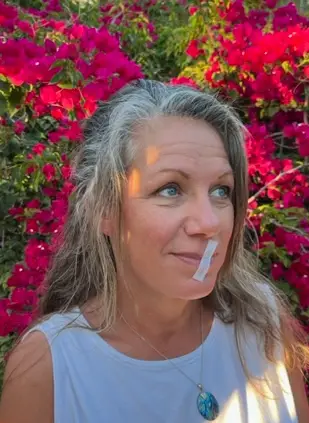
You may feel a little uncomfortable or strange when you first start mouth taping, but with practice, you'll get used to it. It's also important to note that it's not recommended for children, people with sleep apnea or other breathing disorders, or those who have difficulty breathing through their nose.
Now that you know how to properly tape your mouth, let's move on to some tips and tricks to make your mouth taping experience successful.
Tips for Successful Mouth Taping
Now that you have decided to try out mouth taping for teeth grinding, here are a few tips to make it a successful experience.
1. Remember that you only need a small piece of tape that easily pops off for this to work.
2. Ensure that your lips are clean and dry before applying the tape. This will prevent the tape from slipping off during the night. The medical tape I recommend is really not very sticky at all, so any moisture or lip balm on your lips at all will prevent it from sticking well enough to stay.
You can, however, use a natural lip balm to keep your lips moisturized and prevent chapping during the day.
My favorite natural lip balm is the tinted lip balm by MadeOn Skincare. It is made of refined coconut oil, unbleached beeswax, and cocoa butter so is amazing on your lips. You can get it HERE.
3. Be sure to use a fresh piece of tape every night. Not only is this to keep things sanitary and healthy, but the tape will lose its stickiness after one night's use. A fresh piece will provide just the right amount of "hold."
4. Definitely use a hypoallergenic tape like this one, especially if you have sensitive skin. This will prevent any allergic reactions or irritation.
5. Develop a routine for removing the tape in the morning. Gently peel off the tape and wash your face to remove any residue. If you've folded down a small piece before applying, this is even easier.
If you experience any discomfort or difficulty breathing during the night, discontinue the practice and consult your doctor.
Taking these tips into consideration will make your mouth taping experience more successful. However, it's important to be aware of the potential risks associated with this practice, which we'll discuss in the next section.
Potential Risks of Mouth Taping
While mouth taping can be an effective way to prevent tooth grinding, there are some potential risks that you should be aware of.
One of the main concerns is that mouth taping can interfere with your breathing during the night.
If you have any underlying respiratory issues, such as sleep apnea, mouth taping could worsen your symptoms and lead to more serious health problems.
Additionally, if you have a cold or allergies, mouth taping can make it even more difficult to breathe through your nose, which can lead to discomfort and disrupted sleep.
Another risk to consider is that mouth taping can cause skin irritation or sores around your mouth. This is especially true if you are using an adhesive tape that is too strong or if you are prone to sensitive skin.
It's important to use a gentle, medical-grade tape like this one and to apply it correctly to avoid any skin irritation.
Finally, some people may find mouth taping to be uncomfortable or claustrophobic. If you are someone who is easily bothered by having your mouth taped shut, this practice may not be right for you. (Again, I thought this would be me, but I found that I wasn't panicked or claustrophobic at all!)
Overall, while mouth taping can be an effective way to prevent tooth grinding, it's important to understand the potential risks and to consult with your dentist or doctor before trying it out. By taking these precautions, you can ensure a safe and successful mouth taping experience.,
How mouth taping helps you sleep better
The first time I heard about the benefits of mouth taping was when a doctor recommended this video. I was amazed and eager to try it out! I highly recommend watching the full video, as there are many other benefits of mouth taping besides helping you not to grind or clench your teeth at night.
Other Tips for Preventing Bruxism Naturally
Correct Tongue Placement
This was a huge missing piece for me while trying to stop my nighttime teeth grinding and clenching. I actually learned it from my teenage son who'd learned it on YouTube, of all places.
But, IT WORKED!
The main gist is to consciously remember to put your tongue on the roof of your mouth, touching your top teeth. Seems so simple, right? And whoever would have thought that WHERE you keep your tongue would be so important to your health!
If I consciously and consistently remember to do this, it really helps in both my daytime grinding and my nighttime. By practicing this during the day while awake, it becomes habit, and my body is more likely to keep my tongue in the right position while I'm sleeping.
Seriously. Try it.
Natural Supplements
B1 (Thiamine) and vitamin D3 are both essential nutrients for preventing bruxism. This is a great video by Dr. Eric Berg that explains how these supplements help:
Another Affordable Alternative to Dental Night Guards
Mouth taping is obviously a much more affordable option than custom night guards you get at your dentist, but another alternative to dental night guards are ready-to-wear dental guards like this one made by DenTek.
My friend swears by these. They are slim and comfortable and adjustable to the size of your mouth. No boiling or custom molds required! And best of all, much cheaper than the ones you get at the dentist!
You can grab a set to try HERE.
Frequently Asked Questions about Mouth Taping
What kind of tape do you use for mouth taping?
Don't use just any old household tape. Use a medical tape that is hypoallergenic and made for being gentle on the skin.
And even more important...that comes off easily so you don't feel "trapped"...one that will easily pop off if you feel you need to open your mouth to breathe. As I said before, this was one of my biggest concerns before trying out this crazy hack!
The mouth tape I use and recommend is the 3M 1" Micropore S Kind Removal Silicone Tape.
Can you suffocate from mouth taping?
If you are taping correctly with a small strip of the right kind of medical tape like this one by 3M that comes off extremely easily (and sometimes a little too easily, actually), then this is not an issue.
Again, do NOT use masking or duct tape and tape your WHOLE mouth!
Is mouth taping safe?
Yes, mouth taping is extremely safe if you are taping correctly with a small (2" x 1/2") strip of the right kind of medical tape like this one by 3M. It comes off very easily, sometimes with just a big yawn!
What is the best tape for mouth taping?
The best tape I've found for mouth taping is the 1" Micropore S Kind Removal Silicone Tape by 3M. I get it in the 5-yd roll, but since I cut it in half vertically, I can get twice as many strips from it.
Is mouth taping effective?
Mouth taping can be a very effective, yet simple and inexpensive, method for getting a more restful night's sleep, preventing bruxism (teeth grinding), snoring, fatigue, headaches, jaw pain, dental issues, and more.
Have trouble getting to sleep?
Maybe you not only grind your teeth at night, but you also have trouble getting to sleep in the first place!
My absolute top recommendation, besides reading a relaxing book before bed, is "Sleep Spray" by Q Sciences. Just spray it 8 times under your tongue, and in like 10 minutes, you will definitely be ready to SLEEP!
You can learn more about it, and how it was a life-changer for me, in my post Discovering the Tranquility of Night: Q Sleep Spray
A last tip for a restful night's sleep
To get a nice, full, restful night's sleep, you may also want to consider how you wear your hair so that you are cool and comfortable all night long!
Check out my post 11 Ways to Wear your Hair to Bed to Protect your Hair while you Sleep to learn more!
Conclusion
In conclusion, mouth taping may seem like an odd solution, but for me, along with practicing proper tongue position, has been a simple and effective method for helping me "keep my mouth shut" and get a good night's sleep!
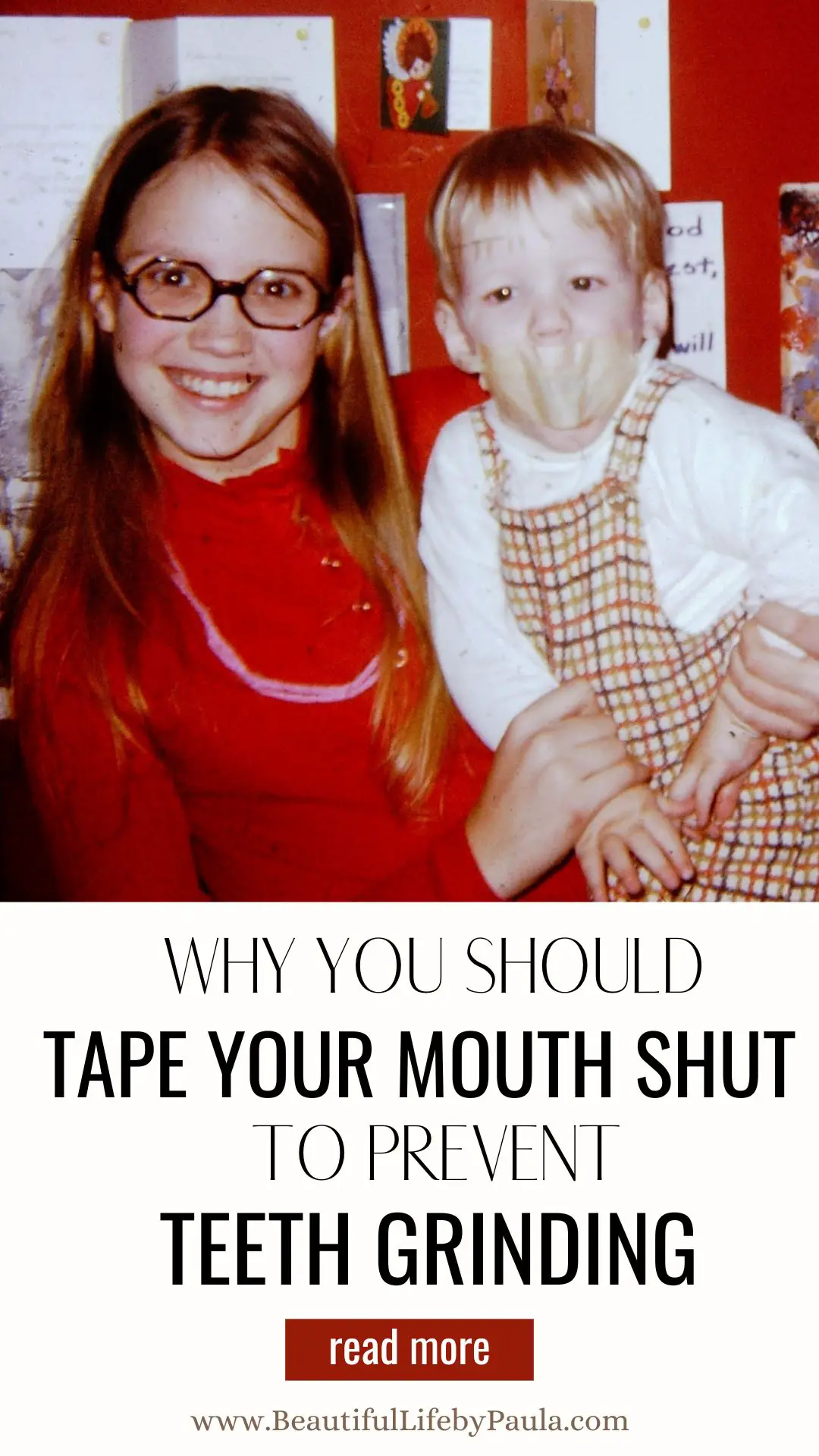
*Disclaimer: This post does not provide medical advice and is intended for informational purposes only. Always seek the advice of your dentist or other qualified health provider with any questions you may have regarding a medical condition. Never disregard professional medical advice or delay in seeking it because of something you have heard or seen on social media.*

